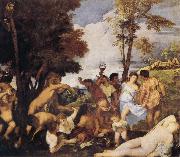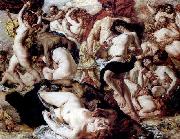Wholesale Oil Painting No Minimum |
|||||||||||
|
|
|||||||||||

|
|||||||||||
|
|
|
||||||||
TitianItalian High Renaissance Painter, ca.1485-1576 Italian painter active in Venice. As a young man he was taught by the Bellini family and worked closely with Giorgione. His early works are so similar in style to Giorgione's as to be indistinguishable, but soon after Giorgione's early death Titian established himself as the leading painter of the Republic of Venice. Among his most important religious paintings is the revolutionary and monumental Assumption (1516 ?C 18) for Santa Maria dei Frari, in which the Virgin ascends to heaven in a blaze of colour accompanied by a semicircle of angels. Titian was also interested in mythological themes, and his many depictions of Venus display his work's sheer beauty and inherent eroticism. Bacchus and Ariadne (1520 ?C 23), with its pagan abandon, is one of the greatest works of Renaissance art. Titian was sought after for his psychologically penetrating portraits, which include portrayals of leading Italian aristocrats, religious figures, and Emperor Charles V. He reached the height of his powers in The Rape of Europa (c. 1559 ?C 62), one of several paintings done for Philip II of Spain. He was recognized as supremely gifted in his lifetime, and his reputation has never declined. |
||||||||
|
|
||||||||
Bacchanalia
Bacchanalia Painting ID:: 33491 |
mk86
c.1519/20
Oil on canvas
175x193cm
Madrid,Museo del Prado
mk86 c.1519/20 Oil on canvas 175x193cm Madrid,Museo del Prado |
|||||||
|
|
||||||||
Auguste Leveque(b. Nivelles, Walloon Brabant 1866 - d. Saint-Josse-ten-Noode, 1921) is a Belgian painter influenced both by realism and symbolism. Leveque was also a sculptor, poet and art theoretician. He studied under Jean-François Portaels at the Academie Royale des Beaux-Arts in Brussels, and received the Prix Godecharle for his painting Job in 1890. Leveque was a member of the "Salon d'Art Idealiste", formed by Jean Delville in Brussels in 1896, which is considered the Belgian equivalent to the Parisian Rose & Cross Salon. Other members of the group were Leon Frederic, Albert Ciamberlani, Constant Montald, Emile Motte, Victor Rousseau, Armand Point and Alexandre Seon. The Salon was abandoned in 1898. |
||||||||
|
|
||||||||
|
|
Bacchanalia
Bacchanalia Painting ID:: 94235 |
Oil on canvas, 96 x 127 cm
cjr Oil on canvas, 96 x 127 cm cjr |
||||||
|
|
||||||||
|
Auguste Leveque (b. Nivelles, Walloon Brabant 1866 - d. Saint-Josse-ten-Noode, 1921) is a Belgian painter influenced both by realism and symbolism. Leveque was also a sculptor, poet and art theoretician. He studied under Jean-François Portaels at the Academie Royale des Beaux-Arts in Brussels, and received the Prix Godecharle for his painting Job in 1890. Leveque was a member of the "Salon d'Art Idealiste", formed by Jean Delville in Brussels in 1896, which is considered the Belgian equivalent to the Parisian Rose & Cross Salon. Other members of the group were Leon Frederic, Albert Ciamberlani, Constant Montald, Emile Motte, Victor Rousseau, Armand Point and Alexandre Seon. The Salon was abandoned in 1898. Bacchanalia Oil on canvas, 96 x 127 cm cjr |
||||||||
|
|
||||||||
|
Prev Next
|
||||||||
|
|
||||||||
|
Related Paintings to Auguste Leveque :. |
||||||||
|
|
||||||||
|
CONTACT US |


